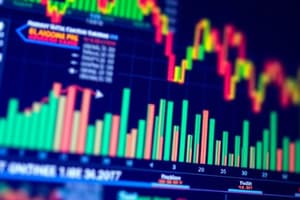Podcast
Questions and Answers
ORBIS primarily focuses on data collection for public companies.
ORBIS primarily focuses on data collection for public companies.
False (B)
Refinitiv Eikon is also known as Thomson Datastream.
Refinitiv Eikon is also known as Thomson Datastream.
True (A)
The AIS can solely support budgeting and forecasting functions without data from databases like ORBIS.
The AIS can solely support budgeting and forecasting functions without data from databases like ORBIS.
False (B)
ORBIS contains data from over 400 million companies.
ORBIS contains data from over 400 million companies.
The integration of databases with AIS does not impact its analytical capabilities.
The integration of databases with AIS does not impact its analytical capabilities.
ENI had its highest revenue in the year 2015.
ENI had its highest revenue in the year 2015.
Cross-sectional data includes information from multiple units at different points in time.
Cross-sectional data includes information from multiple units at different points in time.
In the year 2020, ENEL reported 65 in revenues, which is higher than ACEA SPA's revenues for the same year.
In the year 2020, ENEL reported 65 in revenues, which is higher than ACEA SPA's revenues for the same year.
Panel data is also referred to as cross-sectional time series data.
Panel data is also referred to as cross-sectional time series data.
In the years 2018 and 2019, ENI's revenues both were reported as 90.
In the years 2018 and 2019, ENI's revenues both were reported as 90.
Companies engaged in weapons manufacturing are considered ESG compliant by definition.
Companies engaged in weapons manufacturing are considered ESG compliant by definition.
High-polluting companies are commonly referred to as 'green companies'.
High-polluting companies are commonly referred to as 'green companies'.
ESG compliance includes industries like alcohol firms and tobacco firms.
ESG compliance includes industries like alcohol firms and tobacco firms.
Financial statements for the years 2021 and 2022 must be available for companies to be analyzed in this research.
Financial statements for the years 2021 and 2022 must be available for companies to be analyzed in this research.
Companies selected for analysis can have revenues exceeding 3 million.
Companies selected for analysis can have revenues exceeding 3 million.
Flashcards
ORBIS
ORBIS
A database primarily focused on private companies, but also includes public companies. It gathers data for over 400 million companies worldwide.
Refinitiv Eikon LSEG (Thomson Datastream)
Refinitiv Eikon LSEG (Thomson Datastream)
A global database offering financial and economic data, primarily focusing on listed companies. Previously known as Thomson Datastream.
What's the main focus of ORBIS?
What's the main focus of ORBIS?
ORBIS primarily focuses on providing data for private companies, although it also includes data on public companies.
How can ORBIS enhance an AIS?
How can ORBIS enhance an AIS?
Signup and view all the flashcards
What is Refinitiv Eikon LSEG (Thomson Datastream) known for?
What is Refinitiv Eikon LSEG (Thomson Datastream) known for?
Signup and view all the flashcards
Time Series Data
Time Series Data
Signup and view all the flashcards
Cross-Sectional Data
Cross-Sectional Data
Signup and view all the flashcards
Panel Data
Panel Data
Signup and view all the flashcards
What is the difference between cross-sectional and time series data?
What is the difference between cross-sectional and time series data?
Signup and view all the flashcards
How does panel data differ from time series data?
How does panel data differ from time series data?
Signup and view all the flashcards
ESG Non-compliant Industries
ESG Non-compliant Industries
Signup and view all the flashcards
Orbis Database
Orbis Database
Signup and view all the flashcards
Active Companies
Active Companies
Signup and view all the flashcards
Financial Statements
Financial Statements
Signup and view all the flashcards
Operating Revenue
Operating Revenue
Signup and view all the flashcards
Study Notes
Accounting Information Systems and Analytics Course
- The course has no specific prerequisites, but prior knowledge of accounting and corporate finance is recommended
- Course goals include understanding accounting analytics and systems, explaining big data analytics integration into decision-making, describing key methodologies and tools for extracting, analyzing, and visualizing financial and business information, and extracting data from advanced databases
- Practical goals include extracting data, analyzing data with advanced tools for real-time decisions, and creating interactive presentations with sophisticated visualization tools
- Transferable skills include analytical skills, the ability to gather, elaborate, and synthesize information, and problem-solving skills
- Assessment is through a written exam (50%) and an individual report (50%) based on real-company financial data
- Course materials include lectures, conceptual and practical exercises, case studies using Aida, Orbis, Microsoft Excel, and Tableau, and support charts, papers, Excel files, and Tableau templates
- Teaching hours are 28 hours with the instructor, 7 hours with Consuelo Pavan (Adacta), and 7 hours with Domenico Piscitelli (Moody's Analytics)
- The course will use various software including Aida, Orbis, Microsoft Excel, and Tableau.
Databases Available
- Refinitiv Eikon and ORBIS provide essential financial data for accounting analyses
- Eikon (Thomson Datastream): Focuses on public companies, providing detailed financial data including equities, market indices, exchange rates, interest rates, commodities, and futures
- Orbis (Moody's product): Focuses on private companies and also public companies; Offers data regarding over 400 million companies, enhancing detailed analysis across diverse companies
Topics
- Topic 1: Main Financial Databases
- Topic 2A: Data Analysis: Tips and Tools
- Topic 2B: ESG Indicators
- Topic 3: Introduction to Orbis
- Topic 4: Financial Indices
- Topic 5: Data Analysis: VLOOKUP and Pivot Tables
Data Analysis and Recommendations
- Recommendation 1: Understanding financial statement submission dates is crucial
- Recommendation 2: Familiarity with sector/industry classifications (ATECO, NACE, SIC, NAICS) is vital
- Recommendation 3: Knowing how to use different data structures is essential.
- Time Series: Data analysis over multiple time periods for a single entity
- Cross Sectional: Data analysis on multiple entities at a single point in time
- How to Export Data: Procedures for exporting data from company records
- How to Import Data: Procedures for importing data into company records
ESG (Environmental, Social, and Governance)
- ESG performance index: measures a company's ESG performance related to implementation and outcomes of ESG practices
- ESG disclosure index: measures the quantity and quality of environmental, social, and corporate governance data disclosed by a company
Financial Metrics
-
Sales Growth: [(sales period(t) – sales period(t-1)) / (sales period(t-1))]*100
-
EBITDA: Earnings Before Interest, Taxes, Depreciation, and Amortization; calculated as (Total Revenue – Total Costs + Depreciation + Amortization)
-
EBITDA Margin: EBITDA divided by total revenue, a benchmark for company operational efficiency
-
Current Ratio: Current assets divided by current liabilities, a key financial metric assessing short-term financial obligation meeting
-
ROA (Return on Assets): Net income divided by total assets, measuring a firm's profitability in relation to resources used.
-
ROE (Return on Equity): Net income divided by average shareholders' equity for a year, measuring a firm's efficiency in using its shareholder's capital.
Studying That Suits You
Use AI to generate personalized quizzes and flashcards to suit your learning preferences.




